Dissertation: CSR and Long-Term Sustainability for Johnson & Johnson
VerifiedAdded on 2020/06/04
|40
|11708
|113
Dissertation
AI Summary
This dissertation examines Corporate Social Responsibility (CSR) as a strategic tool for fostering long-term sustainability within the international pharmaceutical company Johnson & Johnson (J&J). The study investigates the impact of CSR on stakeholder relationships, business performance, and the formation of a sustainable business model. The research includes an in-depth literature review of CSR and stakeholder theory, analyzing stakeholder groups, their characteristics, and their influence on J&J's business operations. The methodology involves a detailed analysis of J&J’s CSR initiatives, including the Health for Humanity 2020 program and other initiatives, and their alignment with sustainable development goals. The findings explore the interaction between the company and its stakeholders, examining how CSR contributes to building trust and loyalty, enhancing brand image, and ultimately ensuring long-term sustainability. The dissertation provides recommendations for strengthening J&J’s CSR strategy and its overall contribution to a sustainable future, offering valuable insights for other pharmaceutical companies as well. The research addresses the rationale of studying CSR in the context of long-term sustainability, its significance, and the structure of the dissertation. The analysis includes how J&J can ensure long-term sustainability by employing competent CSR strategies. The research also incorporates the study of characteristics of stakeholder groups and their individual impact on the business of the company. In addition, the study investigates the opinions of stakeholders, both external and internal, and assesses the needs of each group to find points of interaction between the company and stakeholder groups.

Dissertation
Paraphrase This Document
Need a fresh take? Get an instant paraphrase of this document with our AI Paraphraser
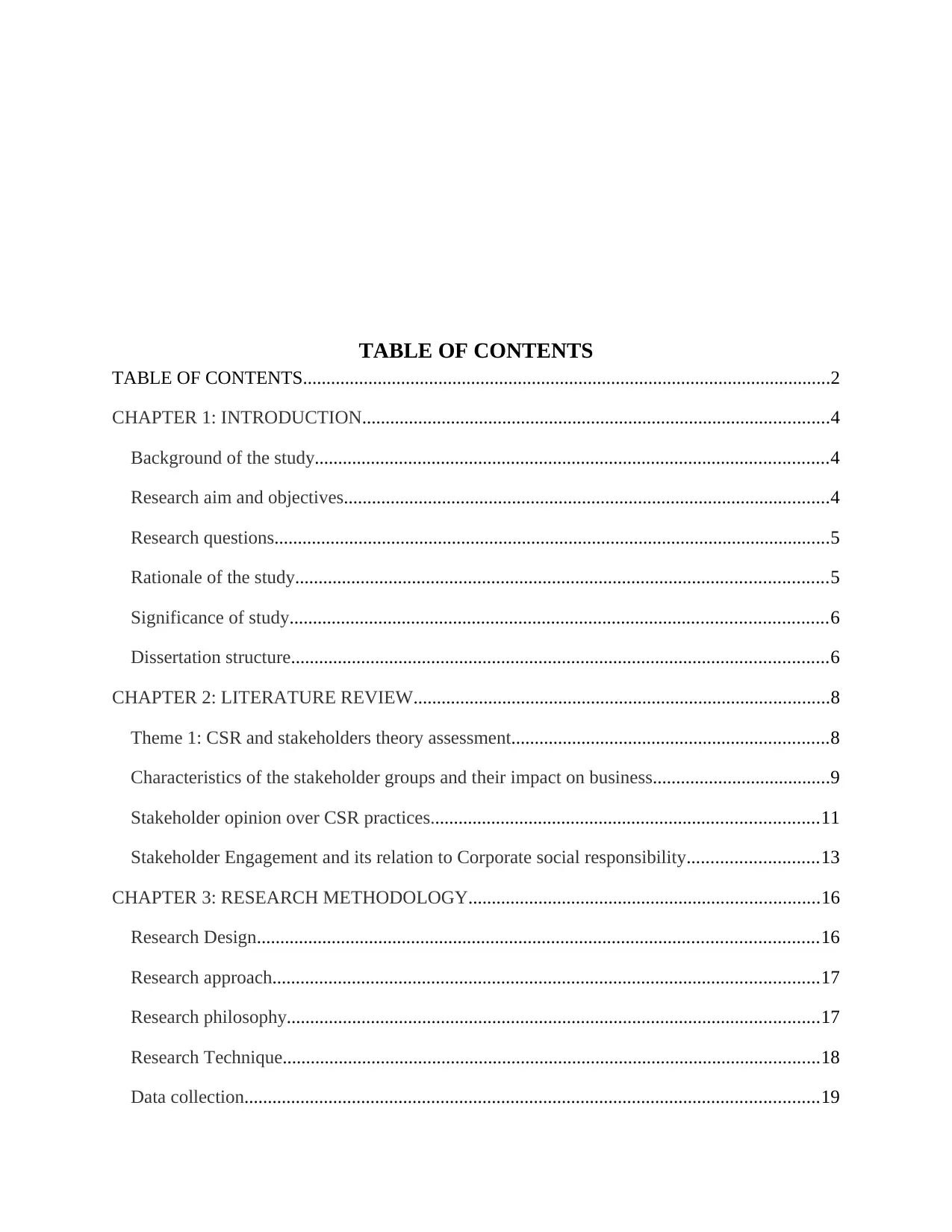
TABLE OF CONTENTS
TABLE OF CONTENTS.................................................................................................................2
CHAPTER 1: INTRODUCTION....................................................................................................4
Background of the study..............................................................................................................4
Research aim and objectives........................................................................................................4
Research questions.......................................................................................................................5
Rationale of the study..................................................................................................................5
Significance of study...................................................................................................................6
Dissertation structure...................................................................................................................6
CHAPTER 2: LITERATURE REVIEW.........................................................................................8
Theme 1: CSR and stakeholders theory assessment....................................................................8
Characteristics of the stakeholder groups and their impact on business......................................9
Stakeholder opinion over CSR practices...................................................................................11
Stakeholder Engagement and its relation to Corporate social responsibility............................13
CHAPTER 3: RESEARCH METHODOLOGY...........................................................................16
Research Design........................................................................................................................16
Research approach.....................................................................................................................17
Research philosophy..................................................................................................................17
Research Technique...................................................................................................................18
Data collection...........................................................................................................................19
TABLE OF CONTENTS.................................................................................................................2
CHAPTER 1: INTRODUCTION....................................................................................................4
Background of the study..............................................................................................................4
Research aim and objectives........................................................................................................4
Research questions.......................................................................................................................5
Rationale of the study..................................................................................................................5
Significance of study...................................................................................................................6
Dissertation structure...................................................................................................................6
CHAPTER 2: LITERATURE REVIEW.........................................................................................8
Theme 1: CSR and stakeholders theory assessment....................................................................8
Characteristics of the stakeholder groups and their impact on business......................................9
Stakeholder opinion over CSR practices...................................................................................11
Stakeholder Engagement and its relation to Corporate social responsibility............................13
CHAPTER 3: RESEARCH METHODOLOGY...........................................................................16
Research Design........................................................................................................................16
Research approach.....................................................................................................................17
Research philosophy..................................................................................................................17
Research Technique...................................................................................................................18
Data collection...........................................................................................................................19
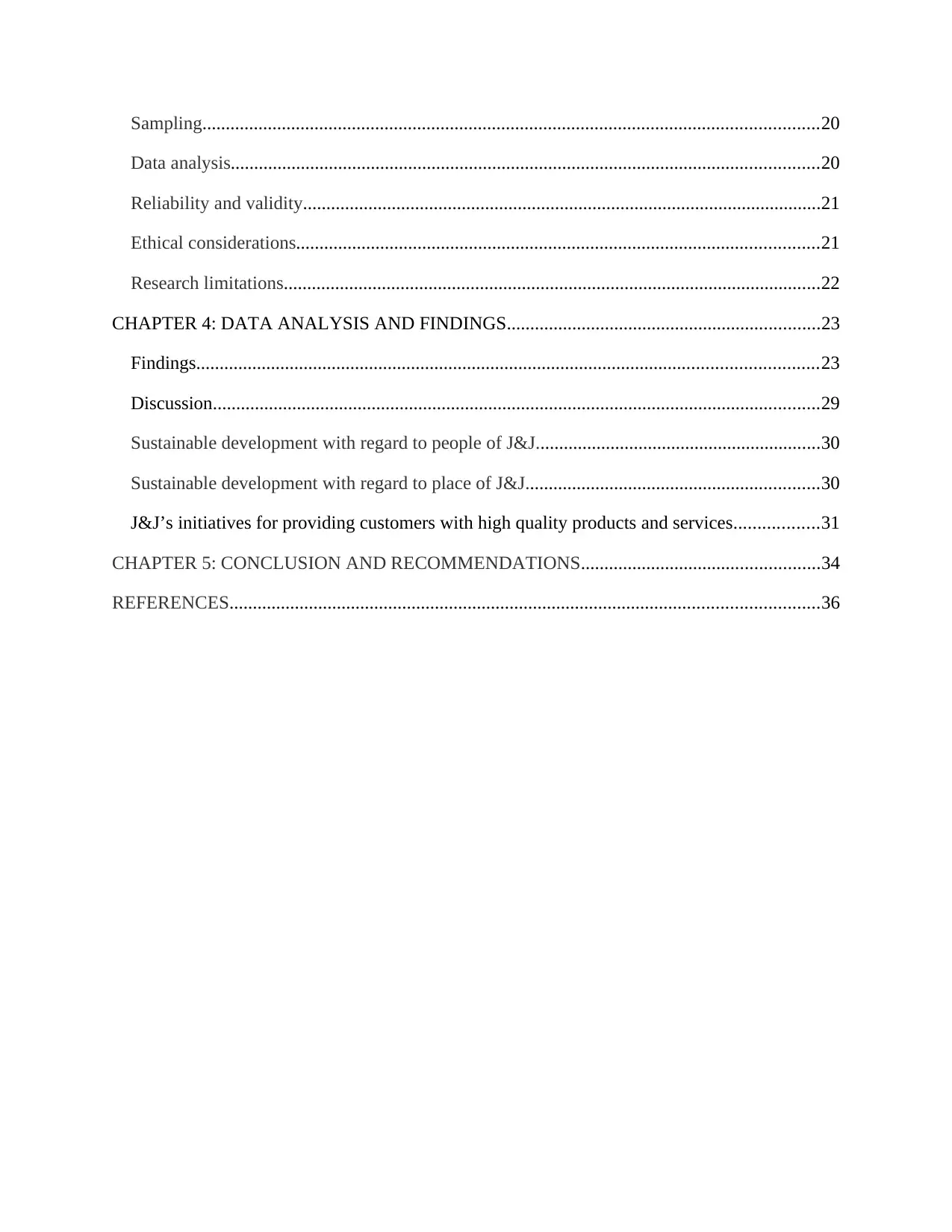
Sampling....................................................................................................................................20
Data analysis..............................................................................................................................20
Reliability and validity...............................................................................................................21
Ethical considerations................................................................................................................21
Research limitations...................................................................................................................22
CHAPTER 4: DATA ANALYSIS AND FINDINGS...................................................................23
Findings.....................................................................................................................................23
Discussion..................................................................................................................................29
Sustainable development with regard to people of J&J.............................................................30
Sustainable development with regard to place of J&J...............................................................30
J&J’s initiatives for providing customers with high quality products and services..................31
CHAPTER 5: CONCLUSION AND RECOMMENDATIONS...................................................34
REFERENCES..............................................................................................................................36
Data analysis..............................................................................................................................20
Reliability and validity...............................................................................................................21
Ethical considerations................................................................................................................21
Research limitations...................................................................................................................22
CHAPTER 4: DATA ANALYSIS AND FINDINGS...................................................................23
Findings.....................................................................................................................................23
Discussion..................................................................................................................................29
Sustainable development with regard to people of J&J.............................................................30
Sustainable development with regard to place of J&J...............................................................30
J&J’s initiatives for providing customers with high quality products and services..................31
CHAPTER 5: CONCLUSION AND RECOMMENDATIONS...................................................34
REFERENCES..............................................................................................................................36
⊘ This is a preview!⊘
Do you want full access?
Subscribe today to unlock all pages.

Trusted by 1+ million students worldwide
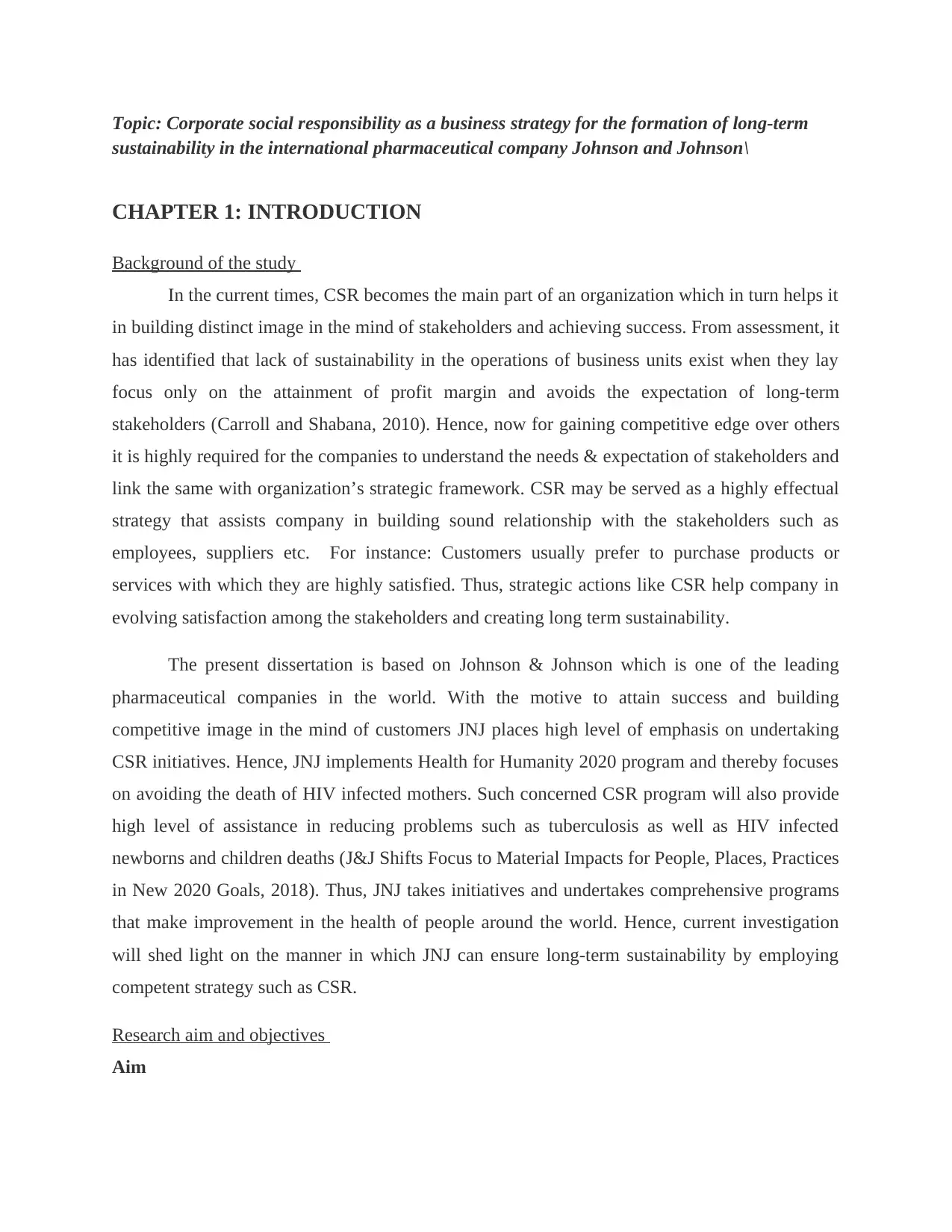
Topic: Corporate social responsibility as a business strategy for the formation of long-term
sustainability in the international pharmaceutical company Johnson and Johnson\
CHAPTER 1: INTRODUCTION
Background of the study
In the current times, CSR becomes the main part of an organization which in turn helps it
in building distinct image in the mind of stakeholders and achieving success. From assessment, it
has identified that lack of sustainability in the operations of business units exist when they lay
focus only on the attainment of profit margin and avoids the expectation of long-term
stakeholders (Carroll and Shabana, 2010). Hence, now for gaining competitive edge over others
it is highly required for the companies to understand the needs & expectation of stakeholders and
link the same with organization’s strategic framework. CSR may be served as a highly effectual
strategy that assists company in building sound relationship with the stakeholders such as
employees, suppliers etc. For instance: Customers usually prefer to purchase products or
services with which they are highly satisfied. Thus, strategic actions like CSR help company in
evolving satisfaction among the stakeholders and creating long term sustainability.
The present dissertation is based on Johnson & Johnson which is one of the leading
pharmaceutical companies in the world. With the motive to attain success and building
competitive image in the mind of customers JNJ places high level of emphasis on undertaking
CSR initiatives. Hence, JNJ implements Health for Humanity 2020 program and thereby focuses
on avoiding the death of HIV infected mothers. Such concerned CSR program will also provide
high level of assistance in reducing problems such as tuberculosis as well as HIV infected
newborns and children deaths (J&J Shifts Focus to Material Impacts for People, Places, Practices
in New 2020 Goals, 2018). Thus, JNJ takes initiatives and undertakes comprehensive programs
that make improvement in the health of people around the world. Hence, current investigation
will shed light on the manner in which JNJ can ensure long-term sustainability by employing
competent strategy such as CSR.
Research aim and objectives
Aim
sustainability in the international pharmaceutical company Johnson and Johnson\
CHAPTER 1: INTRODUCTION
Background of the study
In the current times, CSR becomes the main part of an organization which in turn helps it
in building distinct image in the mind of stakeholders and achieving success. From assessment, it
has identified that lack of sustainability in the operations of business units exist when they lay
focus only on the attainment of profit margin and avoids the expectation of long-term
stakeholders (Carroll and Shabana, 2010). Hence, now for gaining competitive edge over others
it is highly required for the companies to understand the needs & expectation of stakeholders and
link the same with organization’s strategic framework. CSR may be served as a highly effectual
strategy that assists company in building sound relationship with the stakeholders such as
employees, suppliers etc. For instance: Customers usually prefer to purchase products or
services with which they are highly satisfied. Thus, strategic actions like CSR help company in
evolving satisfaction among the stakeholders and creating long term sustainability.
The present dissertation is based on Johnson & Johnson which is one of the leading
pharmaceutical companies in the world. With the motive to attain success and building
competitive image in the mind of customers JNJ places high level of emphasis on undertaking
CSR initiatives. Hence, JNJ implements Health for Humanity 2020 program and thereby focuses
on avoiding the death of HIV infected mothers. Such concerned CSR program will also provide
high level of assistance in reducing problems such as tuberculosis as well as HIV infected
newborns and children deaths (J&J Shifts Focus to Material Impacts for People, Places, Practices
in New 2020 Goals, 2018). Thus, JNJ takes initiatives and undertakes comprehensive programs
that make improvement in the health of people around the world. Hence, current investigation
will shed light on the manner in which JNJ can ensure long-term sustainability by employing
competent strategy such as CSR.
Research aim and objectives
Aim
Paraphrase This Document
Need a fresh take? Get an instant paraphrase of this document with our AI Paraphraser
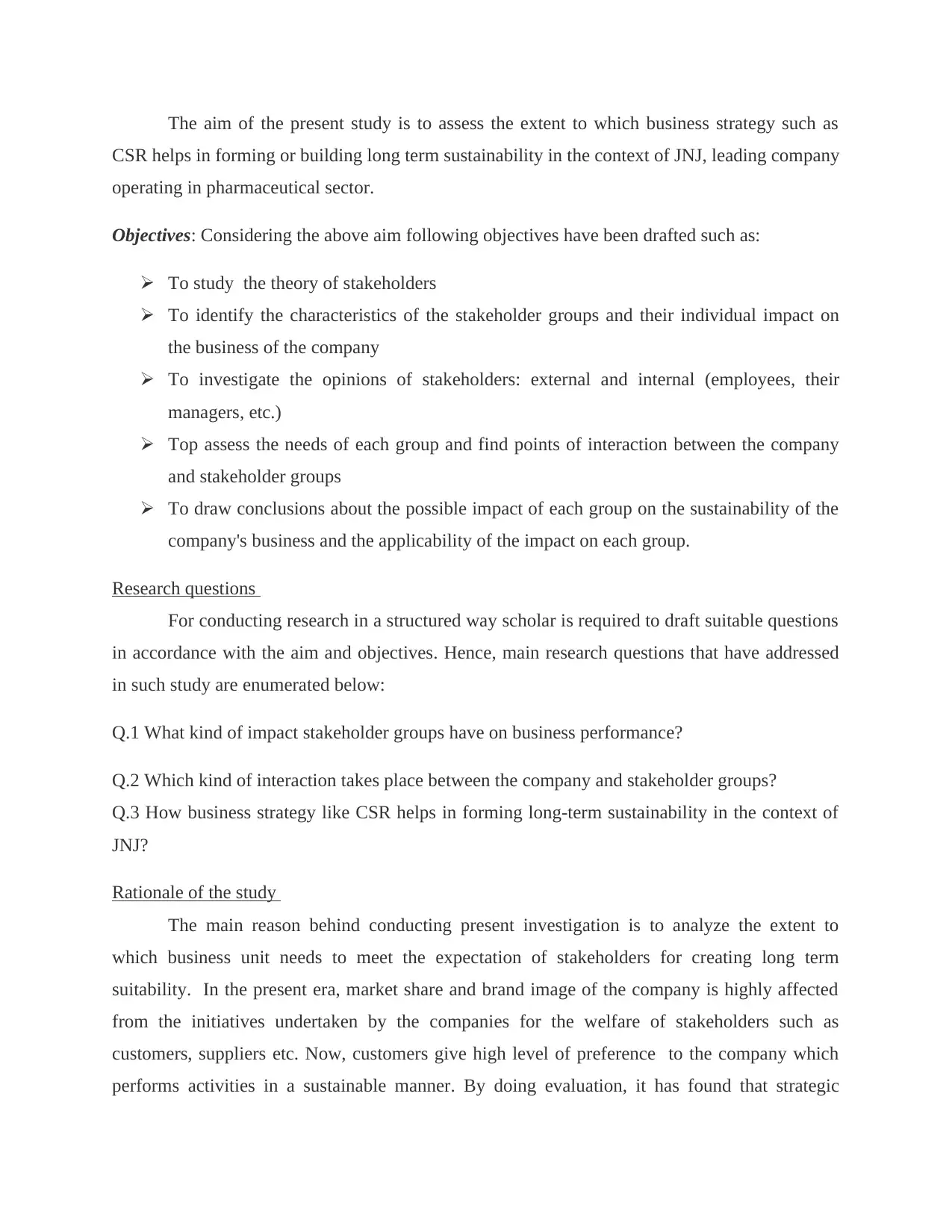
The aim of the present study is to assess the extent to which business strategy such as
CSR helps in forming or building long term sustainability in the context of JNJ, leading company
operating in pharmaceutical sector.
Objectives: Considering the above aim following objectives have been drafted such as:
To study the theory of stakeholders
To identify the characteristics of the stakeholder groups and their individual impact on
the business of the company
To investigate the opinions of stakeholders: external and internal (employees, their
managers, etc.)
Top assess the needs of each group and find points of interaction between the company
and stakeholder groups
To draw conclusions about the possible impact of each group on the sustainability of the
company's business and the applicability of the impact on each group.
Research questions
For conducting research in a structured way scholar is required to draft suitable questions
in accordance with the aim and objectives. Hence, main research questions that have addressed
in such study are enumerated below:
Q.1 What kind of impact stakeholder groups have on business performance?
Q.2 Which kind of interaction takes place between the company and stakeholder groups?
Q.3 How business strategy like CSR helps in forming long-term sustainability in the context of
JNJ?
Rationale of the study
The main reason behind conducting present investigation is to analyze the extent to
which business unit needs to meet the expectation of stakeholders for creating long term
suitability. In the present era, market share and brand image of the company is highly affected
from the initiatives undertaken by the companies for the welfare of stakeholders such as
customers, suppliers etc. Now, customers give high level of preference to the company which
performs activities in a sustainable manner. By doing evaluation, it has found that strategic
CSR helps in forming or building long term sustainability in the context of JNJ, leading company
operating in pharmaceutical sector.
Objectives: Considering the above aim following objectives have been drafted such as:
To study the theory of stakeholders
To identify the characteristics of the stakeholder groups and their individual impact on
the business of the company
To investigate the opinions of stakeholders: external and internal (employees, their
managers, etc.)
Top assess the needs of each group and find points of interaction between the company
and stakeholder groups
To draw conclusions about the possible impact of each group on the sustainability of the
company's business and the applicability of the impact on each group.
Research questions
For conducting research in a structured way scholar is required to draft suitable questions
in accordance with the aim and objectives. Hence, main research questions that have addressed
in such study are enumerated below:
Q.1 What kind of impact stakeholder groups have on business performance?
Q.2 Which kind of interaction takes place between the company and stakeholder groups?
Q.3 How business strategy like CSR helps in forming long-term sustainability in the context of
JNJ?
Rationale of the study
The main reason behind conducting present investigation is to analyze the extent to
which business unit needs to meet the expectation of stakeholders for creating long term
suitability. In the present era, market share and brand image of the company is highly affected
from the initiatives undertaken by the companies for the welfare of stakeholders such as
customers, suppliers etc. Now, customers give high level of preference to the company which
performs activities in a sustainable manner. By doing evaluation, it has found that strategic
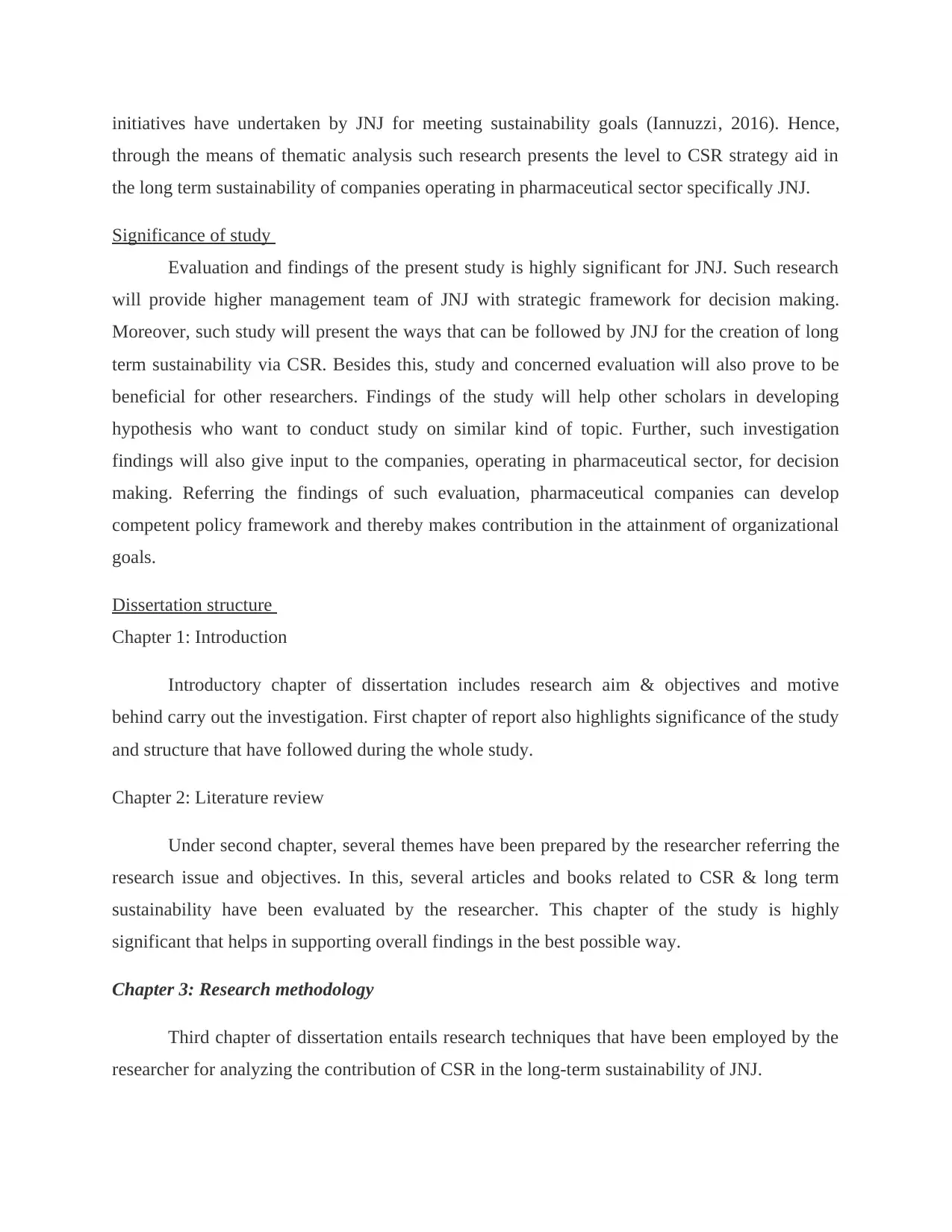
initiatives have undertaken by JNJ for meeting sustainability goals (Iannuzzi, 2016). Hence,
through the means of thematic analysis such research presents the level to CSR strategy aid in
the long term sustainability of companies operating in pharmaceutical sector specifically JNJ.
Significance of study
Evaluation and findings of the present study is highly significant for JNJ. Such research
will provide higher management team of JNJ with strategic framework for decision making.
Moreover, such study will present the ways that can be followed by JNJ for the creation of long
term sustainability via CSR. Besides this, study and concerned evaluation will also prove to be
beneficial for other researchers. Findings of the study will help other scholars in developing
hypothesis who want to conduct study on similar kind of topic. Further, such investigation
findings will also give input to the companies, operating in pharmaceutical sector, for decision
making. Referring the findings of such evaluation, pharmaceutical companies can develop
competent policy framework and thereby makes contribution in the attainment of organizational
goals.
Dissertation structure
Chapter 1: Introduction
Introductory chapter of dissertation includes research aim & objectives and motive
behind carry out the investigation. First chapter of report also highlights significance of the study
and structure that have followed during the whole study.
Chapter 2: Literature review
Under second chapter, several themes have been prepared by the researcher referring the
research issue and objectives. In this, several articles and books related to CSR & long term
sustainability have been evaluated by the researcher. This chapter of the study is highly
significant that helps in supporting overall findings in the best possible way.
Chapter 3: Research methodology
Third chapter of dissertation entails research techniques that have been employed by the
researcher for analyzing the contribution of CSR in the long-term sustainability of JNJ.
through the means of thematic analysis such research presents the level to CSR strategy aid in
the long term sustainability of companies operating in pharmaceutical sector specifically JNJ.
Significance of study
Evaluation and findings of the present study is highly significant for JNJ. Such research
will provide higher management team of JNJ with strategic framework for decision making.
Moreover, such study will present the ways that can be followed by JNJ for the creation of long
term sustainability via CSR. Besides this, study and concerned evaluation will also prove to be
beneficial for other researchers. Findings of the study will help other scholars in developing
hypothesis who want to conduct study on similar kind of topic. Further, such investigation
findings will also give input to the companies, operating in pharmaceutical sector, for decision
making. Referring the findings of such evaluation, pharmaceutical companies can develop
competent policy framework and thereby makes contribution in the attainment of organizational
goals.
Dissertation structure
Chapter 1: Introduction
Introductory chapter of dissertation includes research aim & objectives and motive
behind carry out the investigation. First chapter of report also highlights significance of the study
and structure that have followed during the whole study.
Chapter 2: Literature review
Under second chapter, several themes have been prepared by the researcher referring the
research issue and objectives. In this, several articles and books related to CSR & long term
sustainability have been evaluated by the researcher. This chapter of the study is highly
significant that helps in supporting overall findings in the best possible way.
Chapter 3: Research methodology
Third chapter of dissertation entails research techniques that have been employed by the
researcher for analyzing the contribution of CSR in the long-term sustainability of JNJ.
⊘ This is a preview!⊘
Do you want full access?
Subscribe today to unlock all pages.

Trusted by 1+ million students worldwide
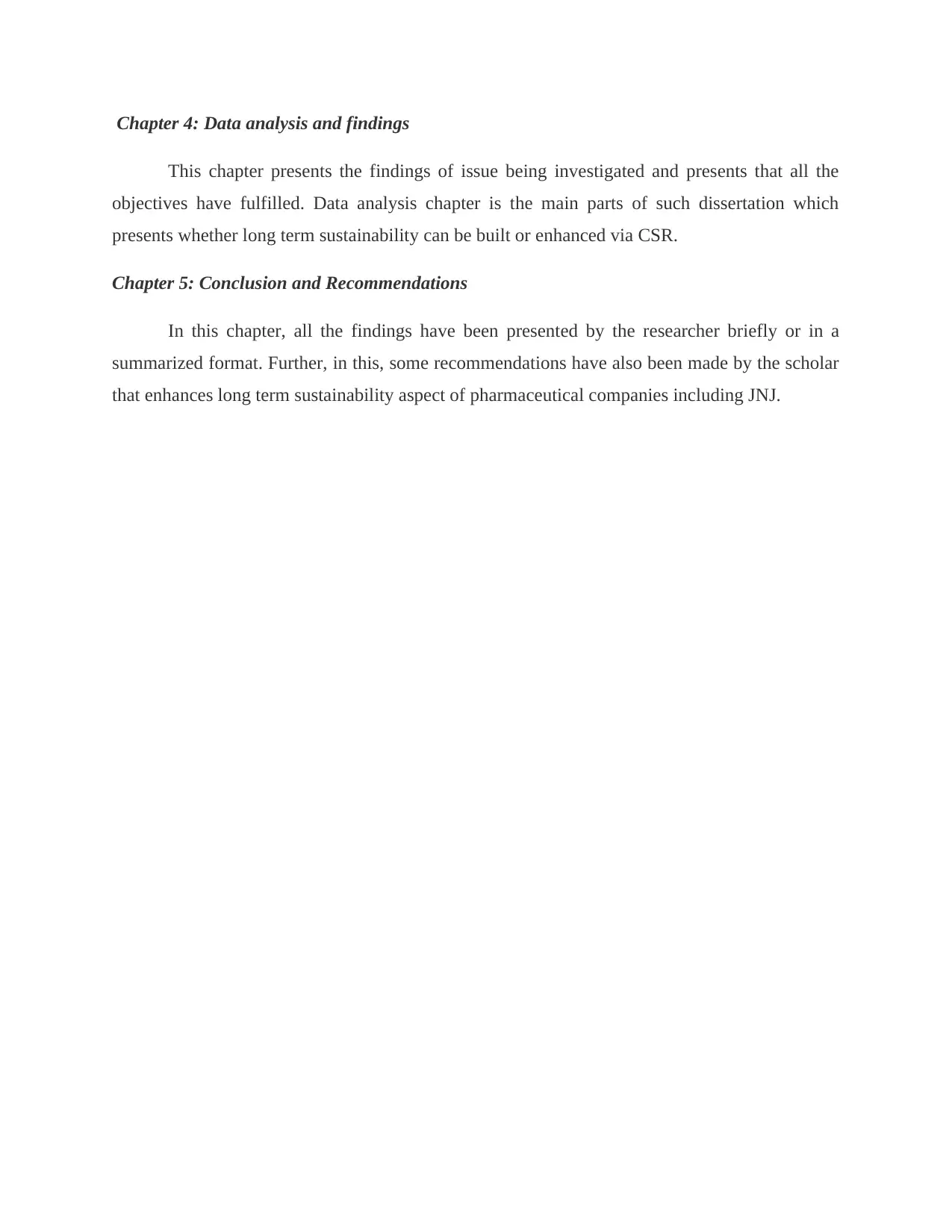
Chapter 4: Data analysis and findings
This chapter presents the findings of issue being investigated and presents that all the
objectives have fulfilled. Data analysis chapter is the main parts of such dissertation which
presents whether long term sustainability can be built or enhanced via CSR.
Chapter 5: Conclusion and Recommendations
In this chapter, all the findings have been presented by the researcher briefly or in a
summarized format. Further, in this, some recommendations have also been made by the scholar
that enhances long term sustainability aspect of pharmaceutical companies including JNJ.
This chapter presents the findings of issue being investigated and presents that all the
objectives have fulfilled. Data analysis chapter is the main parts of such dissertation which
presents whether long term sustainability can be built or enhanced via CSR.
Chapter 5: Conclusion and Recommendations
In this chapter, all the findings have been presented by the researcher briefly or in a
summarized format. Further, in this, some recommendations have also been made by the scholar
that enhances long term sustainability aspect of pharmaceutical companies including JNJ.
Paraphrase This Document
Need a fresh take? Get an instant paraphrase of this document with our AI Paraphraser
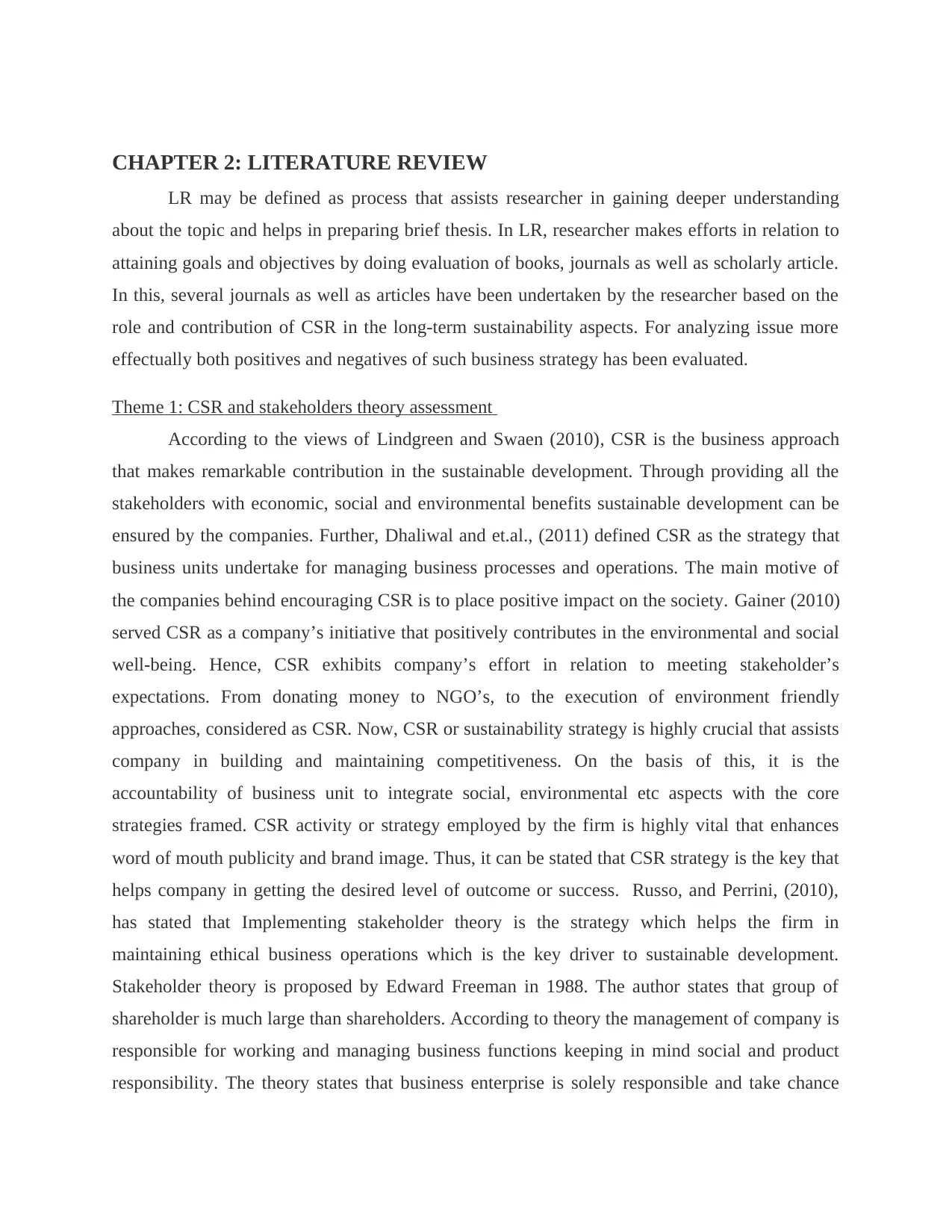
CHAPTER 2: LITERATURE REVIEW
LR may be defined as process that assists researcher in gaining deeper understanding
about the topic and helps in preparing brief thesis. In LR, researcher makes efforts in relation to
attaining goals and objectives by doing evaluation of books, journals as well as scholarly article.
In this, several journals as well as articles have been undertaken by the researcher based on the
role and contribution of CSR in the long-term sustainability aspects. For analyzing issue more
effectually both positives and negatives of such business strategy has been evaluated.
Theme 1: CSR and stakeholders theory assessment
According to the views of Lindgreen and Swaen (2010), CSR is the business approach
that makes remarkable contribution in the sustainable development. Through providing all the
stakeholders with economic, social and environmental benefits sustainable development can be
ensured by the companies. Further, Dhaliwal and et.al., (2011) defined CSR as the strategy that
business units undertake for managing business processes and operations. The main motive of
the companies behind encouraging CSR is to place positive impact on the society. Gainer (2010)
served CSR as a company’s initiative that positively contributes in the environmental and social
well-being. Hence, CSR exhibits company’s effort in relation to meeting stakeholder’s
expectations. From donating money to NGO’s, to the execution of environment friendly
approaches, considered as CSR. Now, CSR or sustainability strategy is highly crucial that assists
company in building and maintaining competitiveness. On the basis of this, it is the
accountability of business unit to integrate social, environmental etc aspects with the core
strategies framed. CSR activity or strategy employed by the firm is highly vital that enhances
word of mouth publicity and brand image. Thus, it can be stated that CSR strategy is the key that
helps company in getting the desired level of outcome or success. Russo, and Perrini, (2010),
has stated that Implementing stakeholder theory is the strategy which helps the firm in
maintaining ethical business operations which is the key driver to sustainable development.
Stakeholder theory is proposed by Edward Freeman in 1988. The author states that group of
shareholder is much large than shareholders. According to theory the management of company is
responsible for working and managing business functions keeping in mind social and product
responsibility. The theory states that business enterprise is solely responsible and take chance
LR may be defined as process that assists researcher in gaining deeper understanding
about the topic and helps in preparing brief thesis. In LR, researcher makes efforts in relation to
attaining goals and objectives by doing evaluation of books, journals as well as scholarly article.
In this, several journals as well as articles have been undertaken by the researcher based on the
role and contribution of CSR in the long-term sustainability aspects. For analyzing issue more
effectually both positives and negatives of such business strategy has been evaluated.
Theme 1: CSR and stakeholders theory assessment
According to the views of Lindgreen and Swaen (2010), CSR is the business approach
that makes remarkable contribution in the sustainable development. Through providing all the
stakeholders with economic, social and environmental benefits sustainable development can be
ensured by the companies. Further, Dhaliwal and et.al., (2011) defined CSR as the strategy that
business units undertake for managing business processes and operations. The main motive of
the companies behind encouraging CSR is to place positive impact on the society. Gainer (2010)
served CSR as a company’s initiative that positively contributes in the environmental and social
well-being. Hence, CSR exhibits company’s effort in relation to meeting stakeholder’s
expectations. From donating money to NGO’s, to the execution of environment friendly
approaches, considered as CSR. Now, CSR or sustainability strategy is highly crucial that assists
company in building and maintaining competitiveness. On the basis of this, it is the
accountability of business unit to integrate social, environmental etc aspects with the core
strategies framed. CSR activity or strategy employed by the firm is highly vital that enhances
word of mouth publicity and brand image. Thus, it can be stated that CSR strategy is the key that
helps company in getting the desired level of outcome or success. Russo, and Perrini, (2010),
has stated that Implementing stakeholder theory is the strategy which helps the firm in
maintaining ethical business operations which is the key driver to sustainable development.
Stakeholder theory is proposed by Edward Freeman in 1988. The author states that group of
shareholder is much large than shareholders. According to theory the management of company is
responsible for working and managing business functions keeping in mind social and product
responsibility. The theory states that business enterprise is solely responsible and take chance
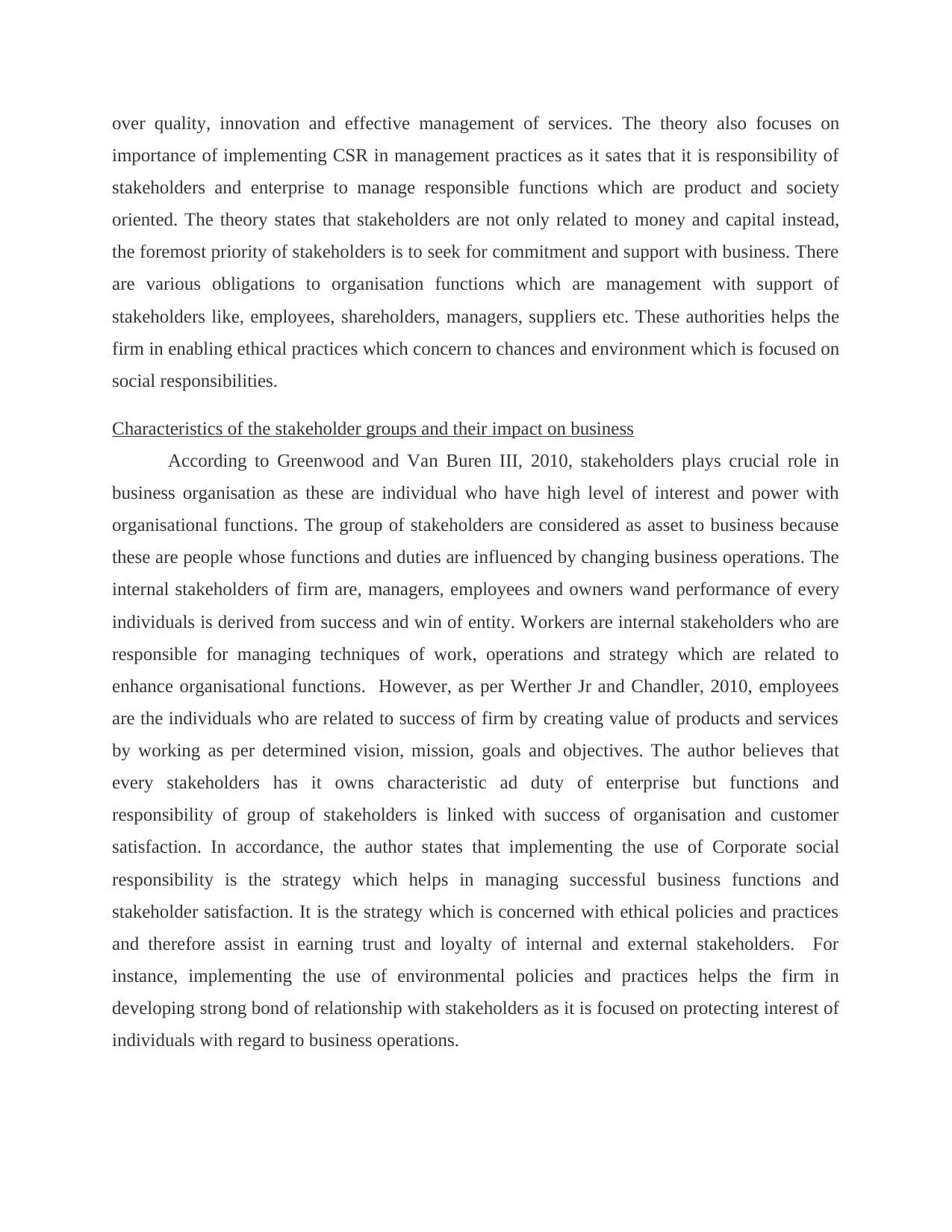
over quality, innovation and effective management of services. The theory also focuses on
importance of implementing CSR in management practices as it sates that it is responsibility of
stakeholders and enterprise to manage responsible functions which are product and society
oriented. The theory states that stakeholders are not only related to money and capital instead,
the foremost priority of stakeholders is to seek for commitment and support with business. There
are various obligations to organisation functions which are management with support of
stakeholders like, employees, shareholders, managers, suppliers etc. These authorities helps the
firm in enabling ethical practices which concern to chances and environment which is focused on
social responsibilities.
Characteristics of the stakeholder groups and their impact on business
According to Greenwood and Van Buren III, 2010, stakeholders plays crucial role in
business organisation as these are individual who have high level of interest and power with
organisational functions. The group of stakeholders are considered as asset to business because
these are people whose functions and duties are influenced by changing business operations. The
internal stakeholders of firm are, managers, employees and owners wand performance of every
individuals is derived from success and win of entity. Workers are internal stakeholders who are
responsible for managing techniques of work, operations and strategy which are related to
enhance organisational functions. However, as per Werther Jr and Chandler, 2010, employees
are the individuals who are related to success of firm by creating value of products and services
by working as per determined vision, mission, goals and objectives. The author believes that
every stakeholders has it owns characteristic ad duty of enterprise but functions and
responsibility of group of stakeholders is linked with success of organisation and customer
satisfaction. In accordance, the author states that implementing the use of Corporate social
responsibility is the strategy which helps in managing successful business functions and
stakeholder satisfaction. It is the strategy which is concerned with ethical policies and practices
and therefore assist in earning trust and loyalty of internal and external stakeholders. For
instance, implementing the use of environmental policies and practices helps the firm in
developing strong bond of relationship with stakeholders as it is focused on protecting interest of
individuals with regard to business operations.
importance of implementing CSR in management practices as it sates that it is responsibility of
stakeholders and enterprise to manage responsible functions which are product and society
oriented. The theory states that stakeholders are not only related to money and capital instead,
the foremost priority of stakeholders is to seek for commitment and support with business. There
are various obligations to organisation functions which are management with support of
stakeholders like, employees, shareholders, managers, suppliers etc. These authorities helps the
firm in enabling ethical practices which concern to chances and environment which is focused on
social responsibilities.
Characteristics of the stakeholder groups and their impact on business
According to Greenwood and Van Buren III, 2010, stakeholders plays crucial role in
business organisation as these are individual who have high level of interest and power with
organisational functions. The group of stakeholders are considered as asset to business because
these are people whose functions and duties are influenced by changing business operations. The
internal stakeholders of firm are, managers, employees and owners wand performance of every
individuals is derived from success and win of entity. Workers are internal stakeholders who are
responsible for managing techniques of work, operations and strategy which are related to
enhance organisational functions. However, as per Werther Jr and Chandler, 2010, employees
are the individuals who are related to success of firm by creating value of products and services
by working as per determined vision, mission, goals and objectives. The author believes that
every stakeholders has it owns characteristic ad duty of enterprise but functions and
responsibility of group of stakeholders is linked with success of organisation and customer
satisfaction. In accordance, the author states that implementing the use of Corporate social
responsibility is the strategy which helps in managing successful business functions and
stakeholder satisfaction. It is the strategy which is concerned with ethical policies and practices
and therefore assist in earning trust and loyalty of internal and external stakeholders. For
instance, implementing the use of environmental policies and practices helps the firm in
developing strong bond of relationship with stakeholders as it is focused on protecting interest of
individuals with regard to business operations.
⊘ This is a preview!⊘
Do you want full access?
Subscribe today to unlock all pages.

Trusted by 1+ million students worldwide
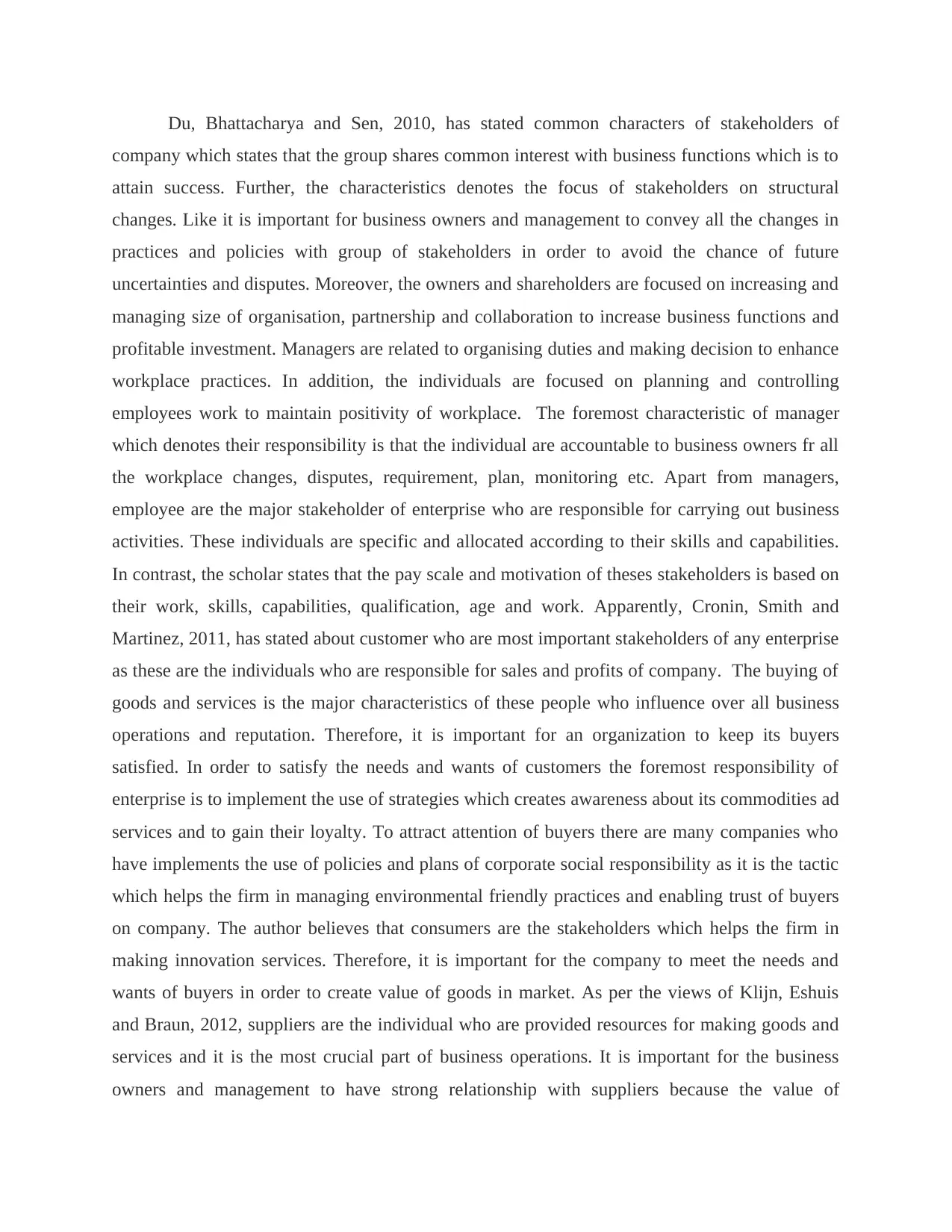
Du, Bhattacharya and Sen, 2010, has stated common characters of stakeholders of
company which states that the group shares common interest with business functions which is to
attain success. Further, the characteristics denotes the focus of stakeholders on structural
changes. Like it is important for business owners and management to convey all the changes in
practices and policies with group of stakeholders in order to avoid the chance of future
uncertainties and disputes. Moreover, the owners and shareholders are focused on increasing and
managing size of organisation, partnership and collaboration to increase business functions and
profitable investment. Managers are related to organising duties and making decision to enhance
workplace practices. In addition, the individuals are focused on planning and controlling
employees work to maintain positivity of workplace. The foremost characteristic of manager
which denotes their responsibility is that the individual are accountable to business owners fr all
the workplace changes, disputes, requirement, plan, monitoring etc. Apart from managers,
employee are the major stakeholder of enterprise who are responsible for carrying out business
activities. These individuals are specific and allocated according to their skills and capabilities.
In contrast, the scholar states that the pay scale and motivation of theses stakeholders is based on
their work, skills, capabilities, qualification, age and work. Apparently, Cronin, Smith and
Martinez, 2011, has stated about customer who are most important stakeholders of any enterprise
as these are the individuals who are responsible for sales and profits of company. The buying of
goods and services is the major characteristics of these people who influence over all business
operations and reputation. Therefore, it is important for an organization to keep its buyers
satisfied. In order to satisfy the needs and wants of customers the foremost responsibility of
enterprise is to implement the use of strategies which creates awareness about its commodities ad
services and to gain their loyalty. To attract attention of buyers there are many companies who
have implements the use of policies and plans of corporate social responsibility as it is the tactic
which helps the firm in managing environmental friendly practices and enabling trust of buyers
on company. The author believes that consumers are the stakeholders which helps the firm in
making innovation services. Therefore, it is important for the company to meet the needs and
wants of buyers in order to create value of goods in market. As per the views of Klijn, Eshuis
and Braun, 2012, suppliers are the individual who are provided resources for making goods and
services and it is the most crucial part of business operations. It is important for the business
owners and management to have strong relationship with suppliers because the value of
company which states that the group shares common interest with business functions which is to
attain success. Further, the characteristics denotes the focus of stakeholders on structural
changes. Like it is important for business owners and management to convey all the changes in
practices and policies with group of stakeholders in order to avoid the chance of future
uncertainties and disputes. Moreover, the owners and shareholders are focused on increasing and
managing size of organisation, partnership and collaboration to increase business functions and
profitable investment. Managers are related to organising duties and making decision to enhance
workplace practices. In addition, the individuals are focused on planning and controlling
employees work to maintain positivity of workplace. The foremost characteristic of manager
which denotes their responsibility is that the individual are accountable to business owners fr all
the workplace changes, disputes, requirement, plan, monitoring etc. Apart from managers,
employee are the major stakeholder of enterprise who are responsible for carrying out business
activities. These individuals are specific and allocated according to their skills and capabilities.
In contrast, the scholar states that the pay scale and motivation of theses stakeholders is based on
their work, skills, capabilities, qualification, age and work. Apparently, Cronin, Smith and
Martinez, 2011, has stated about customer who are most important stakeholders of any enterprise
as these are the individuals who are responsible for sales and profits of company. The buying of
goods and services is the major characteristics of these people who influence over all business
operations and reputation. Therefore, it is important for an organization to keep its buyers
satisfied. In order to satisfy the needs and wants of customers the foremost responsibility of
enterprise is to implement the use of strategies which creates awareness about its commodities ad
services and to gain their loyalty. To attract attention of buyers there are many companies who
have implements the use of policies and plans of corporate social responsibility as it is the tactic
which helps the firm in managing environmental friendly practices and enabling trust of buyers
on company. The author believes that consumers are the stakeholders which helps the firm in
making innovation services. Therefore, it is important for the company to meet the needs and
wants of buyers in order to create value of goods in market. As per the views of Klijn, Eshuis
and Braun, 2012, suppliers are the individual who are provided resources for making goods and
services and it is the most crucial part of business operations. It is important for the business
owners and management to have strong relationship with suppliers because the value of
Paraphrase This Document
Need a fresh take? Get an instant paraphrase of this document with our AI Paraphraser
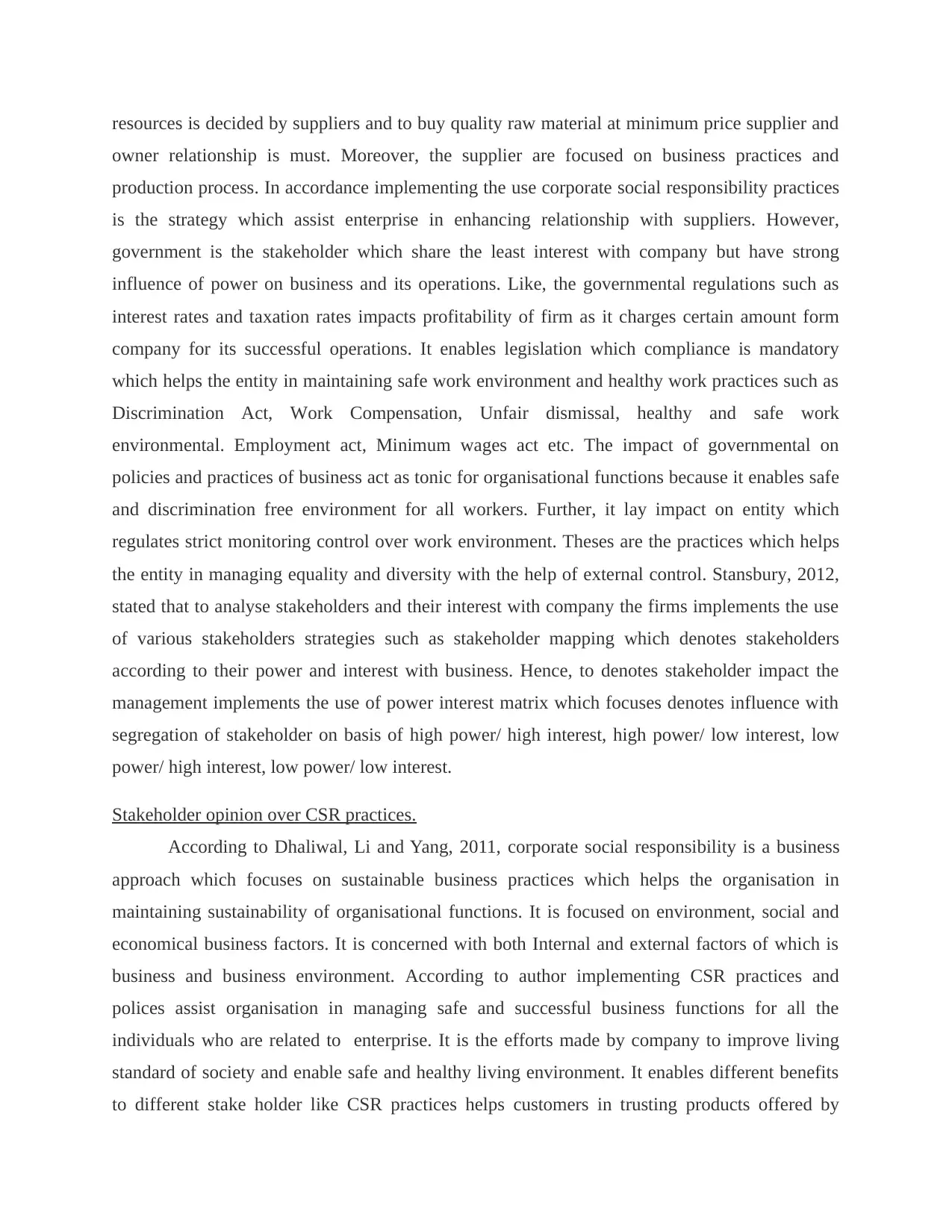
resources is decided by suppliers and to buy quality raw material at minimum price supplier and
owner relationship is must. Moreover, the supplier are focused on business practices and
production process. In accordance implementing the use corporate social responsibility practices
is the strategy which assist enterprise in enhancing relationship with suppliers. However,
government is the stakeholder which share the least interest with company but have strong
influence of power on business and its operations. Like, the governmental regulations such as
interest rates and taxation rates impacts profitability of firm as it charges certain amount form
company for its successful operations. It enables legislation which compliance is mandatory
which helps the entity in maintaining safe work environment and healthy work practices such as
Discrimination Act, Work Compensation, Unfair dismissal, healthy and safe work
environmental. Employment act, Minimum wages act etc. The impact of governmental on
policies and practices of business act as tonic for organisational functions because it enables safe
and discrimination free environment for all workers. Further, it lay impact on entity which
regulates strict monitoring control over work environment. Theses are the practices which helps
the entity in managing equality and diversity with the help of external control. Stansbury, 2012,
stated that to analyse stakeholders and their interest with company the firms implements the use
of various stakeholders strategies such as stakeholder mapping which denotes stakeholders
according to their power and interest with business. Hence, to denotes stakeholder impact the
management implements the use of power interest matrix which focuses denotes influence with
segregation of stakeholder on basis of high power/ high interest, high power/ low interest, low
power/ high interest, low power/ low interest.
Stakeholder opinion over CSR practices.
According to Dhaliwal, Li and Yang, 2011, corporate social responsibility is a business
approach which focuses on sustainable business practices which helps the organisation in
maintaining sustainability of organisational functions. It is focused on environment, social and
economical business factors. It is concerned with both Internal and external factors of which is
business and business environment. According to author implementing CSR practices and
polices assist organisation in managing safe and successful business functions for all the
individuals who are related to enterprise. It is the efforts made by company to improve living
standard of society and enable safe and healthy living environment. It enables different benefits
to different stake holder like CSR practices helps customers in trusting products offered by
owner relationship is must. Moreover, the supplier are focused on business practices and
production process. In accordance implementing the use corporate social responsibility practices
is the strategy which assist enterprise in enhancing relationship with suppliers. However,
government is the stakeholder which share the least interest with company but have strong
influence of power on business and its operations. Like, the governmental regulations such as
interest rates and taxation rates impacts profitability of firm as it charges certain amount form
company for its successful operations. It enables legislation which compliance is mandatory
which helps the entity in maintaining safe work environment and healthy work practices such as
Discrimination Act, Work Compensation, Unfair dismissal, healthy and safe work
environmental. Employment act, Minimum wages act etc. The impact of governmental on
policies and practices of business act as tonic for organisational functions because it enables safe
and discrimination free environment for all workers. Further, it lay impact on entity which
regulates strict monitoring control over work environment. Theses are the practices which helps
the entity in managing equality and diversity with the help of external control. Stansbury, 2012,
stated that to analyse stakeholders and their interest with company the firms implements the use
of various stakeholders strategies such as stakeholder mapping which denotes stakeholders
according to their power and interest with business. Hence, to denotes stakeholder impact the
management implements the use of power interest matrix which focuses denotes influence with
segregation of stakeholder on basis of high power/ high interest, high power/ low interest, low
power/ high interest, low power/ low interest.
Stakeholder opinion over CSR practices.
According to Dhaliwal, Li and Yang, 2011, corporate social responsibility is a business
approach which focuses on sustainable business practices which helps the organisation in
maintaining sustainability of organisational functions. It is focused on environment, social and
economical business factors. It is concerned with both Internal and external factors of which is
business and business environment. According to author implementing CSR practices and
polices assist organisation in managing safe and successful business functions for all the
individuals who are related to enterprise. It is the efforts made by company to improve living
standard of society and enable safe and healthy living environment. It enables different benefits
to different stake holder like CSR practices helps customers in trusting products offered by
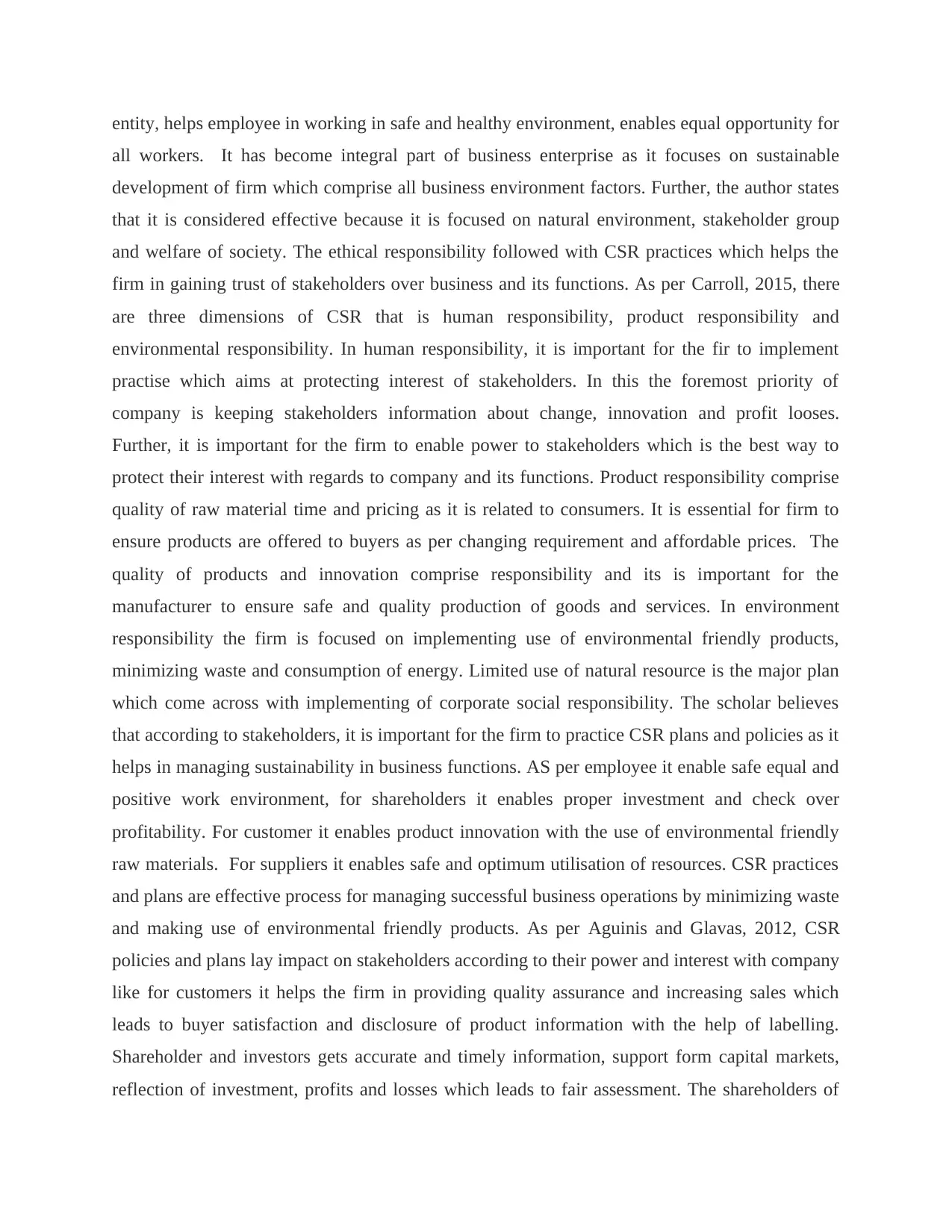
entity, helps employee in working in safe and healthy environment, enables equal opportunity for
all workers. It has become integral part of business enterprise as it focuses on sustainable
development of firm which comprise all business environment factors. Further, the author states
that it is considered effective because it is focused on natural environment, stakeholder group
and welfare of society. The ethical responsibility followed with CSR practices which helps the
firm in gaining trust of stakeholders over business and its functions. As per Carroll, 2015, there
are three dimensions of CSR that is human responsibility, product responsibility and
environmental responsibility. In human responsibility, it is important for the fir to implement
practise which aims at protecting interest of stakeholders. In this the foremost priority of
company is keeping stakeholders information about change, innovation and profit looses.
Further, it is important for the firm to enable power to stakeholders which is the best way to
protect their interest with regards to company and its functions. Product responsibility comprise
quality of raw material time and pricing as it is related to consumers. It is essential for firm to
ensure products are offered to buyers as per changing requirement and affordable prices. The
quality of products and innovation comprise responsibility and its is important for the
manufacturer to ensure safe and quality production of goods and services. In environment
responsibility the firm is focused on implementing use of environmental friendly products,
minimizing waste and consumption of energy. Limited use of natural resource is the major plan
which come across with implementing of corporate social responsibility. The scholar believes
that according to stakeholders, it is important for the firm to practice CSR plans and policies as it
helps in managing sustainability in business functions. AS per employee it enable safe equal and
positive work environment, for shareholders it enables proper investment and check over
profitability. For customer it enables product innovation with the use of environmental friendly
raw materials. For suppliers it enables safe and optimum utilisation of resources. CSR practices
and plans are effective process for managing successful business operations by minimizing waste
and making use of environmental friendly products. As per Aguinis and Glavas, 2012, CSR
policies and plans lay impact on stakeholders according to their power and interest with company
like for customers it helps the firm in providing quality assurance and increasing sales which
leads to buyer satisfaction and disclosure of product information with the help of labelling.
Shareholder and investors gets accurate and timely information, support form capital markets,
reflection of investment, profits and losses which leads to fair assessment. The shareholders of
all workers. It has become integral part of business enterprise as it focuses on sustainable
development of firm which comprise all business environment factors. Further, the author states
that it is considered effective because it is focused on natural environment, stakeholder group
and welfare of society. The ethical responsibility followed with CSR practices which helps the
firm in gaining trust of stakeholders over business and its functions. As per Carroll, 2015, there
are three dimensions of CSR that is human responsibility, product responsibility and
environmental responsibility. In human responsibility, it is important for the fir to implement
practise which aims at protecting interest of stakeholders. In this the foremost priority of
company is keeping stakeholders information about change, innovation and profit looses.
Further, it is important for the firm to enable power to stakeholders which is the best way to
protect their interest with regards to company and its functions. Product responsibility comprise
quality of raw material time and pricing as it is related to consumers. It is essential for firm to
ensure products are offered to buyers as per changing requirement and affordable prices. The
quality of products and innovation comprise responsibility and its is important for the
manufacturer to ensure safe and quality production of goods and services. In environment
responsibility the firm is focused on implementing use of environmental friendly products,
minimizing waste and consumption of energy. Limited use of natural resource is the major plan
which come across with implementing of corporate social responsibility. The scholar believes
that according to stakeholders, it is important for the firm to practice CSR plans and policies as it
helps in managing sustainability in business functions. AS per employee it enable safe equal and
positive work environment, for shareholders it enables proper investment and check over
profitability. For customer it enables product innovation with the use of environmental friendly
raw materials. For suppliers it enables safe and optimum utilisation of resources. CSR practices
and plans are effective process for managing successful business operations by minimizing waste
and making use of environmental friendly products. As per Aguinis and Glavas, 2012, CSR
policies and plans lay impact on stakeholders according to their power and interest with company
like for customers it helps the firm in providing quality assurance and increasing sales which
leads to buyer satisfaction and disclosure of product information with the help of labelling.
Shareholder and investors gets accurate and timely information, support form capital markets,
reflection of investment, profits and losses which leads to fair assessment. The shareholders of
⊘ This is a preview!⊘
Do you want full access?
Subscribe today to unlock all pages.

Trusted by 1+ million students worldwide
1 out of 40
Your All-in-One AI-Powered Toolkit for Academic Success.
+13062052269
info@desklib.com
Available 24*7 on WhatsApp / Email
![[object Object]](/_next/static/media/star-bottom.7253800d.svg)
Unlock your academic potential
Copyright © 2020–2026 A2Z Services. All Rights Reserved. Developed and managed by ZUCOL.
